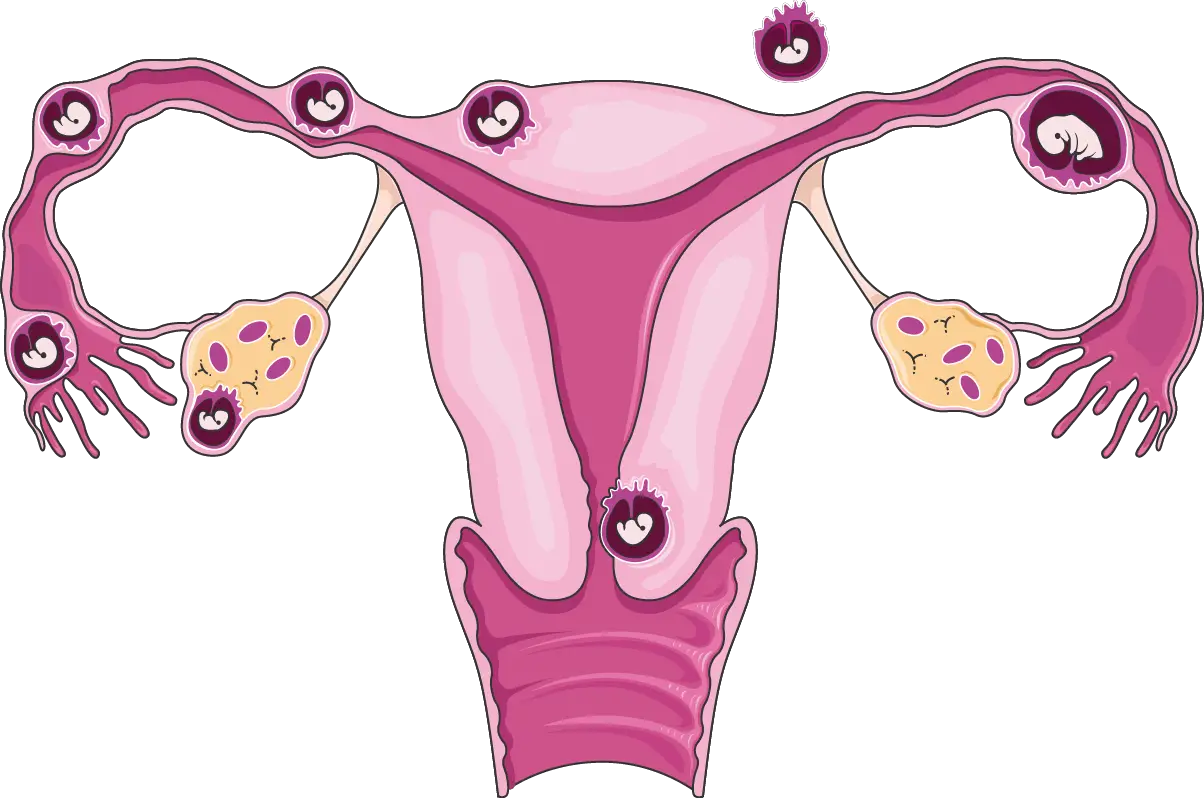Ectopic pregnancy (Extrauterine pregnancy) is the implantation of a fertilized ovum outside the normal site of the endometrial lining of the uterus.
How Common is Ectopic pregnancy?
2% of pregnancy is ectopic (outside uterus lining). And it results in 10% of pregnancy-related death.
Classification of Ectopic Pregnancy
There are 2 types. These are
- Nontubal – It comprises 5% of Ectopic Pregnancies. But it results in 20% mortality. Nontubal ectopic pregnancy further classified into
- Abdominal,
- Ovaries and
- Cervix
- Tubal – It comprises 95% of ectopic pregnancy. It further classifies into
- Ampullary (Commonest type)
- Isthmic
- Interstitial and
- fimbrial end

What are the Risk Factors?
Many identified risk factors are proven to increase the incidence of ectopic pregnancy. For example –
Any conditions which can prevent or retard passage of the fertilized ovum like
- previous inflammatory disease
- pelvic surgery
- developmental abnormality of the tube
- adjacent tumor that block the passage
- pelvic inflammatory disease
- tube sterilization
- previous ectopic pregnancy and
- use of IUD. These pathologies delay the transfer of ovum from the fallopian tube to the uterine endometrial cavity. That means fertilization and implantation will occur inside the tube whresultssult in tubal pregnancy.
There are also functional causes that delay the passage of fertilized ovum functionality. For example, progesterone decreases motility in the tube. That means progesterone-only pills, progesterone bearing IU, D, and post-pill can delay the passage functionality.
Other risk factors include ART and ovulation induction, age > 40 years, hormonal contraceptives, and so on.
The Fate of Tubal Pregnancy
If left untreated
- 16% of the cases will be a tubal mole that is surrounded by blood clots. It can either be absorbed or get infected.
- 53% of the cases will be abort. The most common type of extrauterine pregnancy which is likely to be aborted is the ampullary type. Abortion can be complete or incomplete. it can also result in 2ry abdominal pregnancy.
- 30% of the cases will be ruptured. And isthmus pregnancy is most likely to rupture compare to other types.
Most of the time the fetus dies then either abort completely or mummify or calcify or it might also get infected. But sometimes the pregnancy might result in an alive fetus incase of 2ry abdominal pregnancy (50% of them will have some kind of congenital malformation.)
What are the Signs & Symptoms of Ectopic pregnancy?
The classic triad of symptoms are
- Abdominal pain (in 99% of cases)
- Amenorrhea or missed period (in 74% of cases)
- Vaginal bleeding (in 56% of cases)
These symptoms usually started within 2 months of amenorrhea.
Other uncommon symptoms are
- Shoulder pain – due to irritation of diaphragm and phrenic nerve by the blood.
- Urge to defecate – due to blood pooling in cul de sac
- Lightheadedness – due to massive bleeding
- Fatigue, shock
How to Diagnose Ectopic Pregnancy?
Ectopic pregnancy is mainly a clinical diagnosis (based on signs and symptoms). But to support the diagnosis, your doctor might order some investigations like
- Transvaginal ultrasound – if yolk sac, embryo, or embryonic cardiac activity detected despite empty uterus.
- Serum HCG test
- Serum progesterone level
- Curettage
- Laparoscopy
- Cordocentesis
- MRI
Management of Ectopic pregnancy
Management can be expectant or immediate depending on clinical assessment, site of the pregnancy, and availability of the resource.
Expectant management
Your doctor might consider conservative management if you have
- decreasing HCG titer result
- no evidence of rupture or bleeding
- Hemodynamically stable vital signs
- If the patient wants to avoid both medical and surgical management
Surgical Management
There are 2 surgical options.
Laparoscopic and laparotomy
The laparoscopic surgical option is to make a small hole through your abdomen and see what is inside. Your doctor can do interventions like salpingectomy through the device. The advantage of laparoscopy over laparotomy is, it leaves less scar and has a fast recovery. It also has a few subsequent ectopic pregnancy risks.
But in the case of laparotomy, your doctor makes an incision through your abdomen.
Medical Management
Your doctor might consider medical options if you are clinically stable and willing to comply with post-treatment follow-up.

Summary
Ectopic pregnancy is a clinical condition that can be an emergency and life-threatening. So it needs immediate management in most cases. So, if you experience lower abdominal pain and vaginal bleeding after you missed your monthly menstruation, you should get medical attention immediately.
